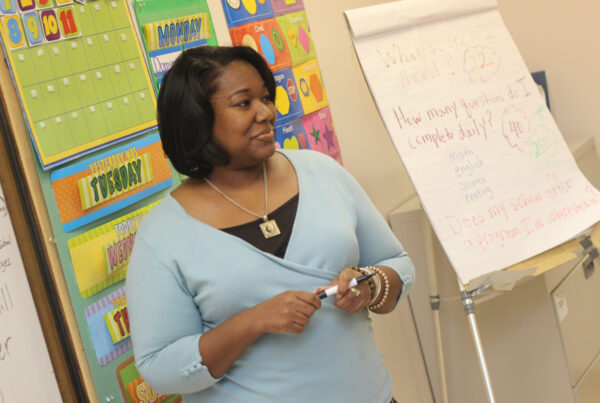It was just about now, only thirty-eight years ago, when I walked into my first interview for my first teaching job. A very small school district in upstate New York, and by very small I mean about 600 students, was searching for a music teacher, more specifically, a band director. The job was to teach instrumental music in grades 4 through 12, lead the elementary band, the high school band, the marching band, the jazz band and other duties as assigned.
I remember my first day of teaching like it was yesterday. I waited patiently for the fifth period bell to ring. I was eager to see the group of band students in the high school and get to work. The bell rang, and students slowly dripped into the classroom. At the sound of the late bell, twelve students had entered the room. Twelve.
“I think we’ll wait a few minutes for the other students to arrive,” I said quite confidently.
“There are no more students coming,” said the young man from the back row. “They all quit last year. Our band is pretty bad.”
I was sure that the crude computer printout of my class was mistaken and that certainly there were more than twelve students in band. But, no, the printout was right…twelve. I spent the next weeks tracking down former band students and talking with them one on one, calling their parents and basically making deals with the kids: come back to band. Try it for thirty days. If after 30 days they wanted out, I agreed to sign their class drop form, no questions asked.
My sales efforts got us to 32 students in a month. By the holidays, we were up to 40. We started our first ever band booster club with families and we made a decision to begin fundraising for new marching band uniforms to replace those that had been used for over 30 years. In the fall of my second year, the marching band performed its first half-time show…ever. They normally just sat in the stands and played bleacher music.
The first public performance of the high school band that first year though was, well, a bit rough as I recall, but the parents and community members who attended the concert were very pleased and heaped praise on both the students and me. The principal was happy. The superintendent was happy. By all accounts, we were on our way.
By the time I left the district three years later, the elementary band program had tripled, and the high school band had over 80 students engaged. The marching band, the jazz band and the concert band had all entered regional competitions and done well placing among the top three in their respective categories. At the end of three years I left knowing that I had left the program in far better shape than I had found it. It was to become my goal for every position I would hold in my career: leave it better than you found it.
Thirty-eight years later, as I transition from my position as Acting State Superintendent of Public Instruction, I have spent some time thinking about all of those years in between and the lessons I learned those first three years of my educational career. I had no idea in 1980 that I would advance my career through leadership positions at the building, district and state levels, I had no idea I would start a company, or be a college professor, or become a nationally-recognized speaker. I had no idea I was capable of writing a book, let alone four. I’ve been reminiscing about my career and how I ended up so very far from where I started. How didI get here? It became clear that my experiences during the first three years of my career shaped who I was and more importantly who I was to become.
What did I learn? I am going to try and capture what I think I learned in those early years and applied to the rest of my career, which by all accounts, was anything but a straight pathway forward.
- See the Future: I didn’t know it then, but I had a vision of what the band program should be. When reality slapped me in the face, I hung onto that vision as I worked ferociously to create the band program that I could see in my mind. I learned early that vision was essential in success and even more important, getting others to buy in to the vision. That was the tricky part.
- Demand and Expect More than Seems Practical: It didn’t matter that I was in a tiny school district and had a fledgling program. It didn’t matter that the student membership in the program was tenuous and could fall apart in as little as 30 days. I expected and demanded the best from my students. I set the bar high. I shared what we would accomplish, and the students stared in disbelief. They, and many of their parents, tried to convince me my expectations were too high. I ignored them. I believed then and I believe now, set the bar high. If you don’t reach it, you will have moved further along had you set the bar lower.
- No Risk, No Reward: I placed my bands in competitions that I knew they would never win. I actually, at times, risked public embarrassment. I gave them music to play that was many times beyond their perceptionof what they could perform. I distinctly remember arriving at a competition with our 40-piece concert band, only to be surrounded by bands that were twice and three times our size. How would we compete? While I didn’t know how we would fair, we definitely would compete!
- Winston Churchill was Right: Never, Ever, Ever, Ever Give Up: Regardless of the obstacles, we kept going. We had one goal, one mission, one vision, to be the very best we could be…period. When every student and parent was on board with that, we flew like eagles.
- Students Can Do Anything You Set Their Mind To: Children are capable of just about anything. When you tap into their talents, their dreams and goals and their internal desire to do well, and you raise the bar on expectations, students will rise to the occasion…every time. Every time. In those days there were six grades of music, with six being the hardest grade of music. We were performing at a grade four or five level; unheard of given our size and assumed lack of skill. We defied the odds and shocked everyone.
- Motivation Begets Success; Success Begets Motivation: The two are intertwined. It was so much fun watching the students realize what they were accomplishing. When other conductors, musicians and music judges would talk with them to not only congratulate them but to underscore that they were, by all practical purposes, an anomaly, the students were only motivated to do more.
- Believe in Your Vision: It’s one thing to set a vision, even a collective one. It’s quite another to actually believe it.
- Reject the “Build it and They Will Come” Mentality: Replace it with “Give them the plans and let them build it.” They’ll do far better than you.
- Engage: At every level. With every person. With every student, every family, every colleague, everybody.
- Relationships Move Mountains: Building relationships with students, their families, community members, and anyone else who had ties to our program reaped huge benefits for us. Much of our success was due to the relationships we made and the kindness and assistance that was shown to us in return.
I was recently being introduced for a keynote address. The person who introduced me used the word “outlier.” I believe the context of the remark was to acknowledge that traditional pathways were not my strong suit! That throughout my career, I took bold steps, significant risks, and did everything to move people in the organization toward the vision of what would be. I took it as a compliment.
If I am an outlier and I have properly defined it, then the roots of that philosophy go all the way back to my first band room in 1980. Fifth period, twelve students, and a dream of far greater things.
And by the way, at the end of the 30-day agreement…no one quit band.



